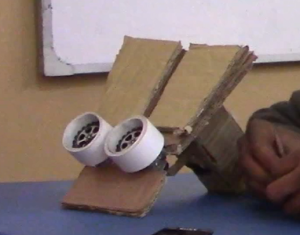Community-connected engineering workshop engages fourth-graders in designing for their own community.
Being an engineer is a powerful concept – one that encourages us to embrace our ideas and bring them to life by finding creative and practical solutions to accomplish our goals. Engineers define goals and then they trust themselves to investigate, tinker, fail, and persist in finding ways to meet them. In a small slum community in Lahore, Pakistan, fourth-graders decided making free toys for themselves and their community was a goal they cared about. Many students from this class came from families that worked as rag-pickers (rag-pickers salvage reusable or recyclable materials thrown away by others to sell for income). The school in this community was run by a non-government organization that hoped to uplift the entire community through educating its children.
In January 2019, one of our graduate students, Fatima Rahman, traveled to her hometown of Lahore and conducted a week-long community connected engineering workshop with these fourth graders. The workshop’s goal was to enable students to see school learning as a way through which they could accomplish their own goals (and those that would benefit their community) such as toy-making in this case. During the workshop the students reflected on their own community, identified a need, and built artifacts to address that need. Through thought exercises and group discussions, some of the many issues identified by the students were preventing mosquito bites, gaining formal access to electricity, and making free toys. As a first attempt to design for their own community, the students were asked to focus on making free toys.
They brought motors from old toy cars, batteries from broken mobile phones, magnets, bottle caps, rubber-bands, wires, and frames of broken toys. The students struggled with building their toys and stayed beyond class time in order to construct their toys. They taught each other how to use the soldering iron and worked together to problem solve. For example, two of the students trying to build a paper airplane-launcher had two motors with bottle caps attached and spinning in opposite directions in order to push the paper airplane sandwiched between them forward. When the bottle caps didn’t work, they brought in old tires to use instead; and when the tires ended up being too far apart, they used tape to reduce the distance between them. They tried for hours to figure out combinations of the two motors turning in order for them to push the paper planes forward. On the sixth day of this workshop the students shared their creations with their families, community members, and other adults.
“I have made these toys so that other kids can play with them!”
“I learned how to make things!”
“I have lots of more things that I want to make!”
“I have things that I will make now!”
“We are Engineers!”
These are among the few things the students said about their experience in the workshop. We hope that, like engineers, the students too will continue to trust themselves and will see their community and school as resources they can value and use to achieve their goals. Learning does not begin or end in school – students are learning everywhere and continue to learn, and they must reserve the right to make school meaningful for themselves.

